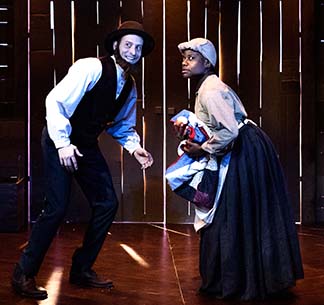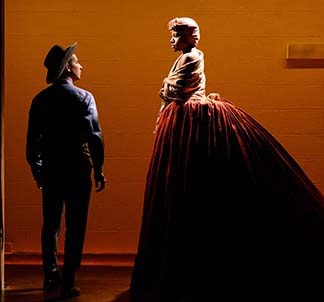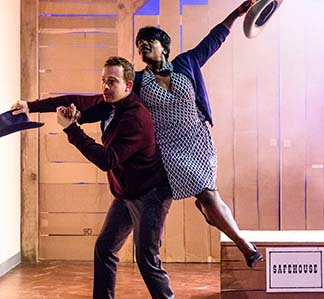By Lucy Komisar
This is not a children‘s game. It is a riveting, compelling, inventive dissection of slavery, the underground railroad, the civil war and racism. In fact, “riveting, compelling, inventive” is a good description of Ars Nova, which presents this play and also created “The Great Comet of 1812,” the Off-Broadway hit just opening on Broadway.
The Underground Railroad Game comes out of the experience of Scott Sheppard, one of the two creator/performers, who in the 5th grade participated in a unit about the civil war that divided students into Union and Confederate soldiers. But this is much more. And definitely not for 5th graders. If the underground railroad gives people the sense of, “at least there was a silver lining” to slavery, this production puts the real story out, with in-your-face realism. Taibi Magar‘s powerful direction is bereft of illusions. And the actor/writers are superb in their roles.

It starts innocently enough. A black woman (Jennifer Kidwell) is terrified when a man with a lantern (Scott Sheppard) enters the barn where she is hiding. But it‘s okay, he‘s a Quaker and this is the underground railroad.
Then audience members are instructed to locate the packets stuck to seat bottoms in which there are miniature blue or gray toy soldiers. They‘ll be asked to wave them at times. Stuart, the teacher, says, “Go blue! If you can successfully move one of these slaves to all of the classrooms in the 5th grade web, you will earn a bonus 100 points for your team and these slaves get to Canada.” Caroline cheers, “Union, union, union!”
It‘s a fun game, no? With subtle satire. Suddenly, the music turns to the 50s tune, “Misty.” “Look at me, I‘m as helpless as a kitten up the tree.” So, how tough is that?
Slaves are OK in a safe house; outside, they can be taken to prison. And teacher Caroline explains, “If at any time you start to feel unsafe, we do have a code word and that word is, “sojourner.” More pop music. How cool can that get?

But a shift to the spiritual, “Wade in the water children,” and we see the silhouette of slave with a high skirt. We are going to learn about plantations, cotton and tobacco, and about the slaves who work in the big house.
Caroline will become Miz Annabelle. She sings “Motherless Child” and pulls off her shawl. Stuart‘s character sucks on her breast. Then he goes under her skirts. No, not for the 5th grade.
Classroom fantasy becomes reality. She tells him they are playing a dangerous game. “Those words don‘t mean the same thing to me that they do to you. You‘re not listening to yourself.”
Scott: Okay, fine. Well, what are we doing?
Jennifer: Reveling in the past.
Scott: Are we reveling in it, or learning from it?
Jennifer: I‘m not sure.

Racism is ever present. A safe house sign has been defaced. The word “niggerlover” is scrawled in a student‘s handwriting. Caroline says the words hurt. And then there is a fascinating playacting lesson.
Stuart says, “we the white people do not understand the horror that it is to be a minority.” Suddenly, he declares his love for her. Then violence erupts. Stuart/a man attacks Caroline with the American flag.
So role reversal, starting with embrace, kissing, sexual touching and then she hits him with a stick. “I haven‘t begun to punish you yet.” He is in black underwear and socks. He is in sex detention.
He raises an arm. “What broad shoulders you have.” She moves the ruler across his body and down his arm. She smacks him, “Ah, ah, ah. And what big hands you have…. Legs. Spread them. Mm, they look fit.” It‘s a slave auction!
“How well do you move…dance for me.” She pulls down his underwear. And more than I describe here. It is his utter slave humiliation.
The school bell rings. Caroline declares, “We lived firsthand what it was like to be a slave in the big house.”
No, they didn‘t, not in that 5th grade class. Not really in a traditional American school.
At the end, the teachers urge the audience to sing the “Battle Hymn of the Republic.” The words stick in my throat. Little glory there. But a brilliant commentary by Scott Sheppard and Jennifer Kidwell on what white Americans think they know and what black Americans do know about slavery.
“Underground Railroad Game.” Written by Scott Sheppard and Jennifer Kidwell, directed by Taibi Magar. Ars Nova, 511 West 54th Street, New York City. 866-811-4111. Opened Sept 13, 2016, closes Nov 11, 2016. 11/03/16.

